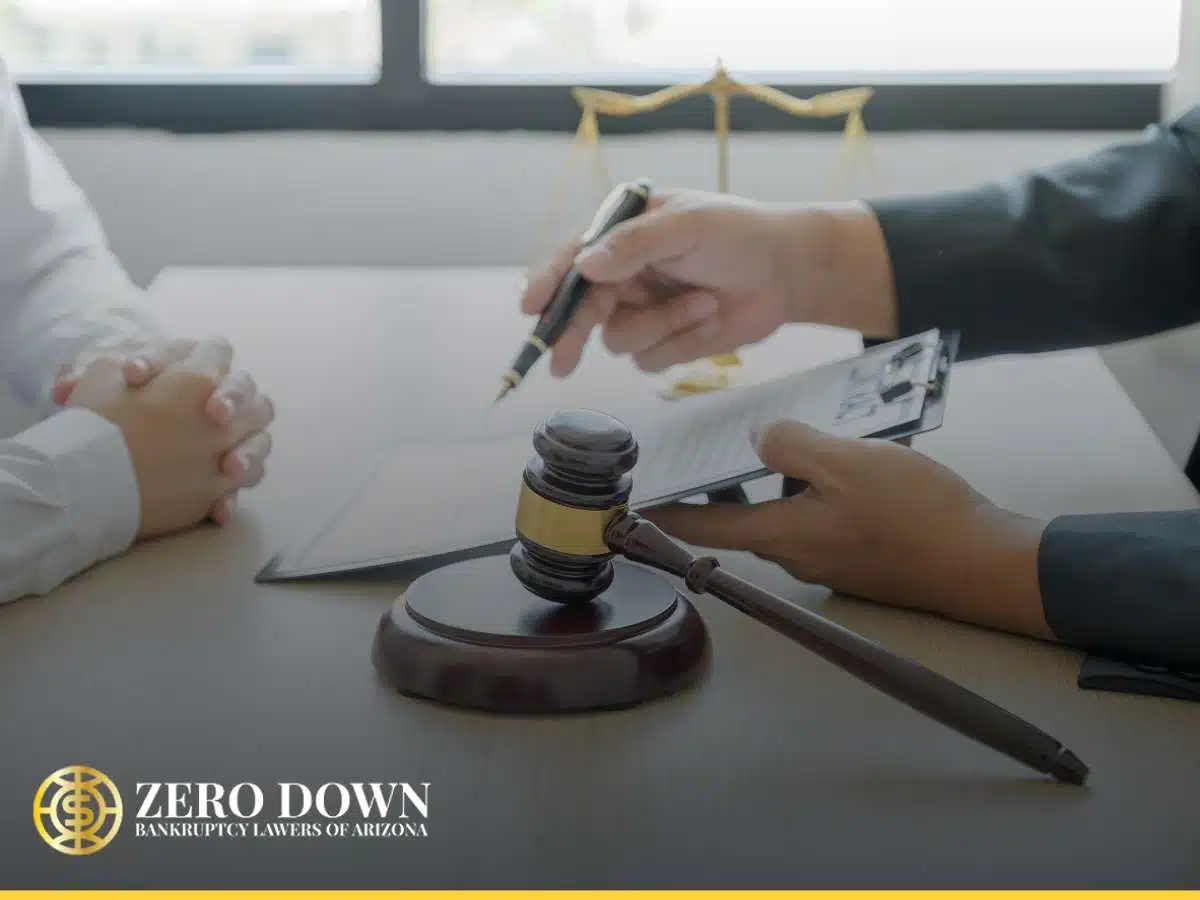If you’ve ever been unfortunate enough to be named as the defendant in a lawsuit, you’re probably familiar with the noticing requirements set forth by Arizona law. For some types of cases, a process server or sheriff’s deputy must personally hand you the notice of the lawsuit, or the summons, for the case to proceed. While this is usually the preferred form of service, some types of legal matters only require that notice of the lawsuit be posted on your door or sent via certified mail. In rare circumstances, the court might allow the plaintiff to notify the defendant about a lawsuit through the newspaper, but this is typically only after preferred methods have failed. Therefore, it is fairly difficult for someone to sue you and obtain a judgment against you without any awareness of the matter on your part. But knowing about a lawsuit and having the defense strategy, legal knowledge, and emotional fortitude to fight back against a lawsuit are separate issues.
When a defendant fails to file a response or appear in court for a set hearing, the judge may be flexible and continue the case once, or even twice for good cause. But a no-call and no-show in court can also result in a default order being issued against the defendant. This is what happened in the case of Colorado football star Shilo Sanders. Because he failed to appear in court when a security guard from his high school sued him for assault, the court issued the plaintiff a judgment for $11.89 million. Even for a professional athlete, this is a crushing amount of debt, especially for someone so young. This resulted in filing for chapter 7 bankruptcy in his early 20’s, despite already being considered a successful football player. This just goes to show that almost anyone can end up filing for bankruptcy. If you’re considering filing for bankruptcy in Phoenix or Tucson, Arizona, you can discuss your situation in detail with one of our experienced debt relief professionals– call (602) 609-7000 to get started today.
Can Default Judgments Be Discharged With Bankruptcy?
There are several factors that can disqualify a debt from being discharged through bankruptcy. Child support can never be cleared by a bankruptcy filing but can be paid off in a Chapter 13 payment plan. Debts that were acquired through fraudulent means, such as using false information for a credit application, are often ineligible for bankruptcy discharge.
Default judgments come most often from nonpayment suits by credit card companies and other creditors. Because these types of debts are unsecured, they can usually be discharged by either form of personal bankruptcy. Some credit card debts can be excluded from bankruptcy if they were for luxury purchases or cash advances in the few months before bankruptcy, but it will usually take longer than that for a creditor to pursue a default judgment. If you defaulted on an old unpaid credit card, it will most likely be dischargeable whether you file for chapter 7 or chapter 13 bankruptcy.
Not every default judgment stems from unpaid credit card debt. Shilo Sanders is a perfect example of this. Instead of an unpaid credit card, his default judgment stems from a lawsuit an employee at his former high school filed against him for an alleged physical attack. While Sanders’ attorney argued that he did not have an opportunity to defend himself against the $11.89 million judgment, Judge Michael Romero stated that Sanders intentionally failed to appear at the hearing. The lawsuit was filed by a former security guard who was left incontinent by severe spinal injuries after Sanders punched and elbowed him for attempting to confiscate his phone. The incident happened in 2015, when Sanders was 15 years old. The security guard filed his lawsuit in 2016, but Sanders and his parents fought off the lawsuit for years until 2019, when his parents were dropped as defendants in the suit. He fired his attorneys in 2020 and did not hire a new legal team until after the verdict against him was rendered. Because he did not notify the court when he transferred to Jackson State to play football with his dad, he only received notifications of his upcoming trial via email, and ultimately did not attend. Despite his absence, the trial proceeded without him in 2022. The judge signed an order finding that the plaintiff’s injuries were a foreseeable consequence of Sanders’ physical assault against him. Now the issue has become whether Sanders was acting willfully and maliciously during that assault, which according to the plaintiff’s lawyers, would make the debt ineligible for discharge in bankruptcy. They have also argued that if Sanders could prove that he didn’t act willfully and maliciously, he would have appealed the judgment already. The judge is still deciding on the matter, which was argued in a hearing that Sanders also did not attend.
It isn’t usually so complicated to discharge default judgments by filing for bankruptcy. It is also considered a default judgment if a creditor sues a debtor in arrears who fails to respond. The court doesn’t consider it willful and malicious when a debtor fails to pay expenses like their credit cards and medical bills. There are some exceptions, but most unsecured non-priority debts are cleared in chapter 7 bankruptcy and the lowest priority of debts paid off in a chapter 13 bankruptcy. If you want to file for chapter 7 bankruptcy like Shilo Sanders, you should evaluate your debts with an experienced professional to confirm their eligibility for the bankruptcy process. Schedule your free consultation with a member of our Phoenix bankruptcy team today by calling (602) 609-7000.
Other Types Of Lawsuits & Bankruptcy
There are endless types of lawsuits besides intentional assault torts and defaults brought by credit card companies. It can be relevant for bankruptcy if you have been involved with a lawsuit, whether you were the defendant or the plaintiff. Often, funds from lawsuits aren’t exempt from bankruptcy, meaning a plaintiff could lose their award if they file for bankruptcy after winning a lawsuit. But this is less common than a lawsuit defendant declaring bankruptcy, as the funds from a lawsuit award can provide financial relief to avoid filing for bankruptcy. Other lawsuits that may be relevant to bankruptcy debtors include:
- Evictions: An eviction is a lawsuit by a landlord to remove a tenant (or squatter) from their property, usually for nonpayment of rent or some other lease violation. The automatic stay from bankruptcy can pause an eviction like any other lawsuit, unless the landlord has already obtained a writ of possession. A tenant who is behind on rent needs to catch up during the bankruptcy if they want to remain in their residence or the landlord will likely proceed with eviction once the bankruptcy is completed.
- Defamation: Defamation is a notoriously difficult type of lawsuit to pursue, but successful plaintiffs have forced notable figures like Alex Jones and Rudy Giuliani into bankruptcy. These debtors typically file for chapter 11 bankruptcy.
- Foreclosures: A home foreclosure is a lawsuit brought by a mortgage lender against a homeowner, usually for defaulting on their mortgage. The automatic stay stops a home foreclosure, but a debtor behind on their mortgage may want to consider chapter 13 over chapter 7. This will spread mortgage arrearages out over the course of a few years, and can even provide the opportunity to clear secondary home mortgages.
- Repossession deficiency: After a repossession occurs, the asset is sold at auction and the borrower can be held liable for any outstanding balance not paid by the proceeds from the sale. This debt can be pursued like other types of unsecured debts, with most creditors preferring to collect by eventually garnishing the debtor’s wages.
Clear Default Judgments And Unsecured Debts With Zero Down Bankruptcy In Phoenix, Arizona
Do you have lingering debts from lawsuits in which you were named as a defendant? Unless the statute of limitations has expired, your creditors can pursue you for these debts and make your life more difficult for years to come. Filing for bankruptcy provides vast protections and creates protections for your assets and income so you can remain financially stable while addressing debt issues. Whether you vigorously defended your prior lawsuit or failed to appear or fight the allegations against you, bankruptcy can probably help. You don’t need to leave this question up to chance when you start the process by consulting with an experienced Arizona bankruptcy lawyer. Our initial consultations by phone are 100% free of charge. To learn more about filing for bankruptcy in Phoenix or Tucson, Arizona, call (602) 609-7000.
Arizona Offices
Phoenix Location:
343 W Roosevelt Street, Suite #100
Phoenix, AZ 85003
Email: [email protected]
Phone: 602-609-7000
Mesa Location:
1731 West Baseline Rd., Suite 101
Mesa, AZ 85202
Email: [email protected]
Glendale Location:
20325 N 51st Avenue, Suite #134
Glendale, AZ 85308
Email: [email protected]
Tucson Location:
2 East Congress, Suite #900
Tucson, AZ 85701
Email: [email protected]










